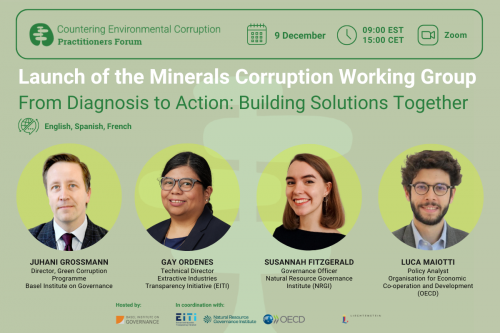Southern Africa’s fight against corruption needs Collective Action

A high-level meeting of heads of anti-corruption agencies in the Southern African Development Community (SADC) last month was a chance to take stock of member countries’ efforts to tackle corruption.
The meeting allowed for a reflection on many ongoing activities and discussions around Collective Action in the region this year. It was the perfect opportunity to reflect on how to galvanise joint efforts against the region’s biggest scourge.
Speaking to delegates, Scarlet Wannenwetsch, Collective Action Specialist, highlighted the underused capacity of the private sector. Businesses are full of dynamism and talent, both of which are critical in fighting corruption and (other) transnational crimes.
To harness the private sector’s potential, she emphasised the importance of building trust by fostering regional multi-stakeholder networks. Bringing together anti-corruption champions from the public sector, private sector and civil society helps to create “good” networks – ones powerful enough to fight the corrupt networks that are holding back development in the region.
Appetite for engagement
The Basel Institute has been a long-standing partner of the SADC Secretariat through the work of the Private Sector team. Our team has been impressed by the level of innovation in the region. Some feature in a publication capturing good practices that was created by, with and for anti-corruption agencies in Africa.
We have also been training SADC corruption prevention officers on how to engage with the private sector through Collective Action approaches.
Our partners consistently express a desire for more opportunities to engage and exchange with other stakeholders. They realise that no one group can tackle corruption alone.
Working towards building a community of practice
To sow the seeds for such a regional multi-stakeholder network, we launched the first Southern African Anti-Corruption Collective Action Forum earlier this year in collaboration with the Southern African Anti-Corruption Network (SAACoN) and The Ethics Institute. The event brought together participants from the private sector, civil society and government institutions to discuss concrete opportunities for learning and collaboration. For many, it was the first time they had met at the regional level.
The event was also a chance to celebrate progress. CoST Uganda won our Southern Africa Anti-Corruption Collective Action Award for its outstanding achievements in tackling corruption and raising business integrity in the region.
What’s next?
In order to build on the momentum of the Forum and on the energy of the SADC region’s anti-corruption leaders, it is crucial that member states continue to prioritise collaboration and Collective Action.
Government anti-corruption agencies needs close, sustained collaboration with the private sector and civil society if they want to develop a more inclusive strategy to prevent corruption – and if they want that strategy to actually work in practice. That applies not only at the country and sector level, but at the regional level too. And that’s what Collective Action can bring.
We look forward to continuing our fruitful collaboration with the SADC Secretariat and wider partners to support anti-corruption Collective Action in the region.
Learn more about our work on the B20 Collective Action Hub and find inspiration in its global database of initiatives.




